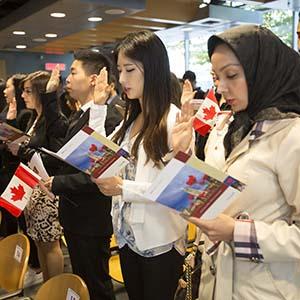
The recent Environics Institute survey of Muslims in Canada reveals a community that belies facile stereotypes – no more so than when you analyze the results along gender lines.
For example, the survey (for which I served as an unpaid consultant) found that fewer Muslim women share the optimism about Canada felt by their male counterparts. And while both groups believe that their Muslim and Canadian identities are very important, when asked to choose between the two, women choose their Muslim identity at a far higher rate. As a corollary, fewer women than men believe that immigrants should set aside their cultural backgrounds and try to blend into Canadian culture. Furthermore, more female immigrants have indicated that their attachment to Islam has increased since moving to Canada.
The survey, based on telephone interviews with 600 Muslims across the country, also provides an interesting snapshot of gender-based attitudes toward community institutions. For example, only 33 per cent of Muslim women attend a mosque at least once a week for prayer, compared with 62 per cent of men. The lack of female attendance is not surprising, given that many mosques do little to encourage female participation. Interestingly, a core of about 20 per cent of women (and men) is unhappy with opportunities for women to play leadership roles in Muslim organizations. This could provide the basis for an unmosqued movement, or the creation of women’s mosques.
When it comes to family life, a whopping 90 per cent of Muslim men and women believe the responsibility for caring for the home and children should be shared equally. However, more men believe that the father must be the master in the home, placing the Muslim level of support for family patriarchy roughly equal to that of Canadians in the 1980s. However, today’s younger Muslim generation rejects patriarchy at roughly the same level as that of other Canadians.
Muslim women are less optimistic about relations with non-Muslims than men are, the survey found. A greater number worry about the reaction of Canadians toward Muslims, believing that the next generation of Muslims will face more discrimination. They are also more concerned about media portrayal of Muslims, and stereotyping by colleagues and neighbours.
It seems the crux of the matter lies in discrimination, as 42 per cent of Muslim women (compared with 27 per cent of men) say they have experienced some form of discrimination or ill-treatment during the past five years. Such incidents occurred mainly in public places – stores, restaurants, banks, public transit. Of women who experienced xenophobia, 60 per cent said they are identifiably Muslim. This ratio is reversed among the 25 per cent of Muslim women who experience difficulties at border crossings. As a result, women worry far more about discrimination, unemployment and Islamophobia than men.
The discrimination concerns are real, as illustrated by employment statistics from the 2011 National Household Survey, in which the unemployment rate of Muslims was 14 per cent, compared with the national average of 7.8 per cent, despite Muslims having high levels of education. The unemployment rate was highest in Quebec (17 per cent), which was double the provincial average. In comparison, the national unemployment rate of visible minorities hovered around 10 per cent.
Even Canadian-born Muslims, who graduated from a Canadian institution, fared worse than the national average, with an unemployment rate of 9.5 per cent. One can only imagine the difficulties in finding employment for the 60,000 Muslim women who head a single-parent household.
Clearly, Muslim women feel more vulnerable about the future, given that they bear a greater brunt of discrimination than their male counterparts.
source : shafaqna













